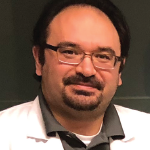Engaging Physicians, PAs & Nurses

Dr. Sudano
“Our goal is to share expertise in the rheumatology field by training primary care physicians, nurse practitioners and physician assistants to feel more confident in diagnosing and treating rheumatic conditions,” Dr. Sudano says. “We’re educating primary care providers about rheumatic diseases while also improving patient care for patients in Arizona.”
UNM has operated a Rheumatology ECHO program since 2006 under the leadership of Arthur Bankhurst, MD, a distinguished professor of medicine and the division chief of rheumatology at the UNM School of Medicine. The UNM program provides training to clinicians on common rheumatic conditions via weekly teleconferences.
Datcha Dorvil, DO, an internist in Winslow, Ariz., participated in Dr. Sudano’s pilot program. “The Rheumatology ECHO program provided me with a great resource for questions and further education on rheumatology diseases,” Dr. Dorvil says. “Each telemedicine session usually starts off with one or two case presentations by rheumatology fellows or participants, a discussion and questions about the case, and then a formal lecture on a rheumatology topic, followed by questions.”
Dr. Dorvil found the ECHO project to be a great resource for physicians like herself who practice in rural areas. She says the training expanded her knowledge of rheumatic diseases, while also teaching the best autoimmune labs to order and their specificity/sensitivity.
“In addition, I learned about fibromyalgia diagnosis and treatment options, the role of vitamin D deficiency in chronic pain and autoimmune diseases, and how to monitor labs [and] side effects and non-pharmaceutical therapies in chronic pain [and] autoimmune diseases,” Dr. Dorvil says. “The Rheumatology ECHO program gives primary care providers more tools to utilize in caring for patients. I feel more comfortable now managing some of my complex rheumatology patients.”
Shubha Kollampare, MBBS, contributed to the project as a fellow at the University of Arizona College of Medicine, Tucson by presenting cases on rheumatoid arthritis, systemic lupus erythematosus and osteoarthritis. “Although the goal was to help staff at remote medical clinics better diagnose and treat rheumatic diseases, preparing for the webinars also helped me develop a better grasp and understanding of rheumatology,” she says.
The initial pilot project ended in June 2018, but Dr. Sudano says he and his colleagues are working to secure funding to extend the Rheumatology ECHO project. He hopes to expand both the scope of the program and the number of providers who participate. Any healthcare provider in Arizona with an interest in rheumatology is invited to join. Register here.


